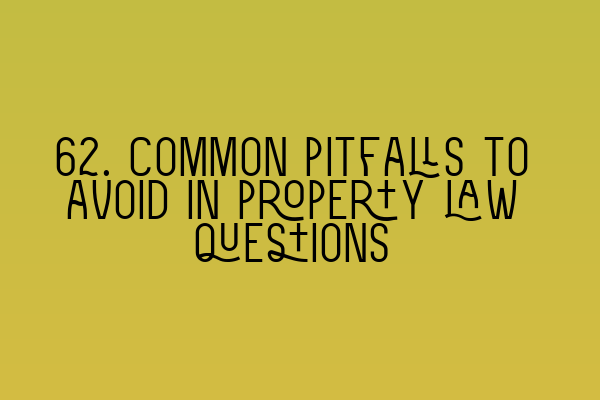62 Common Pitfalls to Avoid in Property Law Questions
Welcome to another informative blog post brought to you by SQE Property Law & Land Law! As solicitors and experts in the field, we understand that property law questions can be complex and challenging. Whether you are a law student preparing for an exam or a legal professional looking to brush up on your knowledge, it’s crucial to be aware of common pitfalls that can trip you up. In this article, we will highlight 62 common pitfalls to help you avoid them and excel in property law.
1. Failure to Identify the Correct Legal Estate
In property law questions, it’s essential to correctly identify the legal estate involved. This can include freehold, leasehold, or a statutory estate, depending on the scenario. Failure to do so can lead to incorrect legal analysis and incorrect application of the law. Be sure to carefully read the question and identify the correct legal estate.
2. Ignoring Statutory Provisions
Property law is heavily governed by statutes, and it’s essential to consider any relevant statutory provisions. Ignoring or overlooking applicable statutes can result in an incomplete or erroneous analysis. Always be thorough in your research and ensure you are familiar with relevant legislation.
3. Neglecting to Consider Equitable Interests
Equitable interests are another critical aspect of property law. Failing to consider equitable interests can lead to an incomplete understanding of the legal rights and obligations of parties involved. Remember to explore both legal and equitable interests and how they may interact in the given scenario.
4. Overcomplicating the Analysis
While property law can be complex, it’s important not to overcomplicate the analysis. Break down the question into its key elements and analyze each element individually. This will help you approach the problem systematically and avoid confusion.
5. Relying on Assumptions
Avoid making assumptions when approaching property law questions. Instead, rely on the facts provided in the question and apply the relevant legal principles. Making assumptions can lead to incorrect conclusions and an inaccurate analysis.
6. Lack of Precision in Terminology
Precision in legal terminology is crucial in property law questions. Ensure you use the appropriate terms and definitions accurately. Ambiguous or imprecise language can result in a flawed analysis.
7. Failure to Address All Aspects of the Question
Be comprehensive in your response to property law questions. Address all aspects of the question and consider all relevant factors. Failing to do so may result in an incomplete analysis and loss of valuable marks.
8. Ignoring Land Registry Requirements
Land registration is an essential aspect of property law. Ignoring the requirements and procedures set out by the Land Registry can lead to incorrect conclusions and a flawed analysis. Familiarize yourself with the Land Registry requirements and incorporate them into your answers.
9. Incorrectly Applying Precedents
Precedents play a significant role in property law. However, it’s crucial to correctly apply the precedents to the given scenario. Misapplying precedents or failing to distinguish between them can result in an inaccurate analysis.
10. Neglecting to Consider Practical Solutions
While legal analysis is important, property law questions often require practical solutions. Neglecting to consider practical aspects can hinder your ability to provide a well-rounded response. Take into account real-world implications and propose practical solutions where appropriate.
These are just 10 of the 62 common pitfalls to avoid in property law questions. If you want to dive deeper into this topic, check out our related articles:
- SQE 1 Practice Exam Questions
- SQE 1 Practice Mocks FLK1 FLK2
- SQE 2 Preparation Courses
- SQE 1 Preparation Courses
- SRA SQE Exam Dates
By being aware of these pitfalls and taking the time to study the related articles, you will be better equipped to handle property law questions with confidence. Good luck with your studies and exams!
This blog post is brought to you by SQE Property Law & Land Law, a leading firm specializing in property law. Our team of expert solicitors can assist you with any property law matters. Contact us today for professional advice and guidance.
